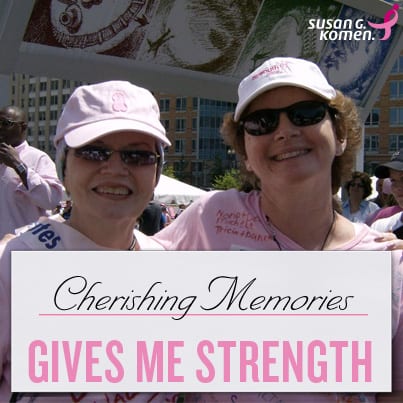Janice Schuster
In Memorial

Those of us still lucky enough to call this Earth home have all survived something that 50 or 100 years ago would have killed us: childbirth, for instance, or workplace accidents, infections and diseases. And most of us have survived any number of challenges and losses: deaths, illnesses, jobs, loves. Many of the relationships and activities that we love do, at some time, come to an end. Some of us will survive because we have endured great harm and abuse.
When we see and name ourselves as survivors, we feel that we are somehow still masters—that challenges formed us, but did not claim or shape us. Survivorship reflects our most admirable qualities: strengths and resilience, resourcefulness and ability to stand and stay strong.
Every October, while we celebrate another month of raising awareness of breast cancer (as pink festoons everything from pickle jars to football gloves, until we yearn to shrug it off or dye it black) we rejoice with those who have endured this disease and emerged, still standing and alive.
In the course of honoring survivors, we can sometimes not see that they continue to struggle with disease and its consequences, from ongoing testing and treatments, to the emotional and financial costs of living with chronic illness. And for those women who have metastatic breast cancer, the only real finish line, sometimes after many years, is death. The Metastatic Breast Cancer Network reports that as many as 155,000 Americans live with the disease, which kills 40,000 people each year.
For the last several years, I did my best to be a companion to my beloved friend and godmother, Peggy, who died in February. When I first heard of her diagnosis, I decided to participate in various events, including five journeys with the Avon Walk for Breast Cancer, two with the Komen Race, and a few for the American Cancer Society. I felt that as long as Peggy was still standing—still working, helping out with grandchildren, and traveling the globe—the least I could do was to stand with and for her. My favorite picture is of the two of us, that first year, standing together under the arches at the finish line in Washington, DC.
During one long round of chemotherapy, I met her each week, where she and her husband spent several hours in a small room while she received her treatment. I felt that somehow, if we could be a laughing and positive presence, the toxic medications would simultaneously do their job without overwhelming side effects. After the treatments, we would sometimes have coffee or lunch. At some point, however, her cancer metastasized, and for all the treatments she underwent, she died. In her final days, I managed to sometimes be a presence, despite my deep sorrow.
It troubles me, the language of disease. Peggy did not survive—and yet she fought hard for years. As a writer, I increasingly feel that we need to change the language we use to reframe our images of the “war on cancer.” Like the other expensive, endless, and ultimately ineffective wars we have waged on terror and drugs, this war drains us, and claims millions of victims. I heard someone suggest that we think of cancer as a neighbor: an unruly, unpleasant, terrible neighbor. We don’t know how it managed to get the property next to ours, and we find his racket, his garbage, his color schemes, offensive and terrible. But unable to relocate, we somehow learn to make do. Since our efforts to manage and treat cancer have rendered it a chronic condition for millions of people, perhaps the bad neighbor metaphor can help us to see—and approach—cancer in different ways.
Beyond that, this year, I’d like to suggest honoring other survivors, too—the ones who did not live to celebrate with us, and the survivors—husbands, wives, sisters, daughters, mothers, aunts, grandmothers, friends—they left behind. For all that we stood with them—with our love, our prayers, our hopes, our resources, our strength—some of our loved ones are not here this year to count among the survivors. And yet, we ourselves are survivors. The fact that all our relentless work did not amount to a win, we did the very best we could—and our love surely strengthened our loved ones, even as they disappeared from this mortal coil. We can celebrate memory—theirs, and our own—and we can keep aiming toward a future where lethal diseases exact less a toll on our lives, even as we know that sometimes, these terrible neighbors will not leave us in peace for long.
